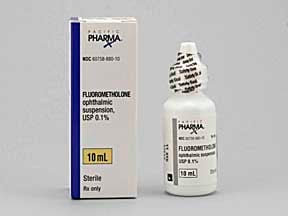
Fluorometholone Coupons & Savings Card – Discount Prices from $50.52
Generic for: Fml, Fml forte, Fml liquifilm
My prescription
Edit
10ML of 0.1%, Fluorometholone (1 Bottle)
Select pharmacy

CVS
$94.08
COUPON PRICE
Walgreens
$50.52
COUPON PRICE
Albertsons
$97.08
COUPON PRICE
Walmart
$143.70
COUPON PRICEFluorometholone savings card
Show this card to your pharmacist
Walgreens
$50.52
BIN
ID
PCN
GRP
015995
LHKPY243740
GDC
DR33
Powered by
More prescriptions for eye inflammation
More prescriptions for eye inflammation
Price history for Fml Forte (brand) & Fluorometholone (generic)
1 Bottle, 10ML of 0.1%
Average retail price for Fml Forte
Average retail price for Fluorometholone
Average SaveHealth price for Fluorometholone
Our price history data is based on aggregated prescription data collected from participating pharmacies in America. Our prescription data updates daily to reflect the latest price changes. If you notice a missing data point, it means there wasn't sufficient data available to generate a monetary value for that date.
We analyzed Fluorometholone prices for (10ML of 0.1%, 1 Bottle) over the last 12 months. The average retail price was $381.34, while the average price using the SaveHealth discount card was $91.31. That's a savings of approximately 76.06% when using our Fluorometholone coupon.
Compared to the generic version, Fml Forte had an average price of $435.89 over the same time period. With the SaveHealth savings card, Fluorometholone is 79.05% cheaper on average than Fml Forte.
*Retail prices are based on pharmacy claims data, and may not be accurate when we don't have enough claims.
Fluorometholone dosage forms
Dosage Quantity Price from Per unit 10ML of 0.1% 1 Bottle $94.08 $94.08 10ML of 0.1% 2 Bottles $161.86 $80.93 10ML of 0.1% 3 Bottles $229.64 $76.55
| Dosage | Quantity | Price from | Per unit |
|---|---|---|---|
| 10ML of 0.1% | 1 Bottle | $94.08 | $94.08 |
| 10ML of 0.1% | 2 Bottles | $161.86 | $80.93 |
| 10ML of 0.1% | 3 Bottles | $229.64 | $76.55 |
